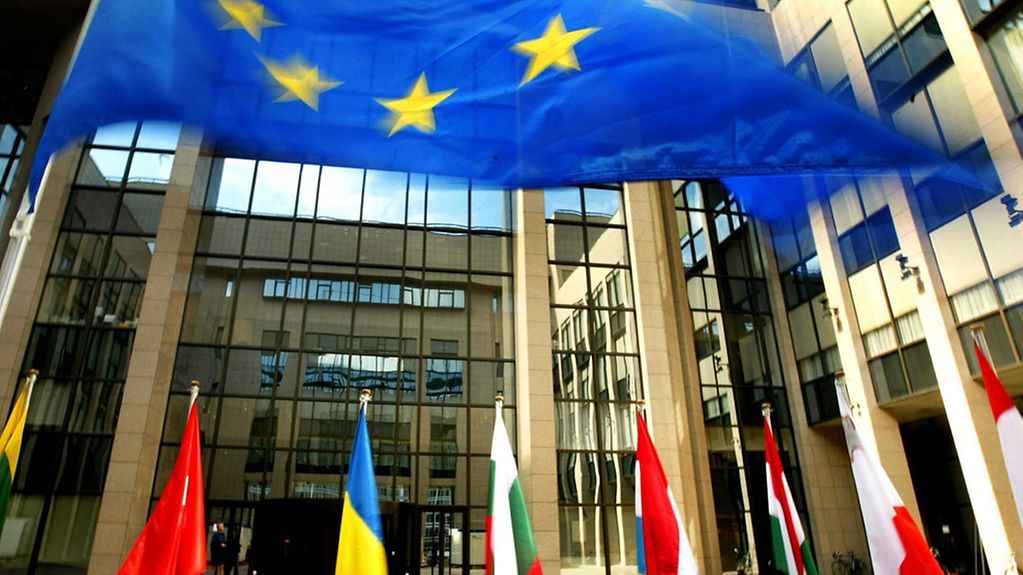EU Foreign Affairs Council
The German government expressly supports the conclusions of the EU Foreign Affairs Council which met on 22 July. They stipulate that a package of further significant restrictive measures will be imposed should Russia fail to meet the calls for cooperation immediately and in full. The 28 Permanent Representatives to the EU in Brussels are still hammering out the details.
4 min reading time

On 22 July in Brussels the EU Foreign Affairs Council discussed additional measures against Russia
Photo: picture-alliance / dpa
On Thursday the Permanent Representatives Committee (Coreper) decided to extend sanctions. Another 15 Russians and Ukrainians are to be placed on the sanctions list along with nine companies and nine institutions for the first time.
Sanctions already having an impact
Federal Foreign Minister Frank-Walter Steinmeier defended this step against criticism. A look at the figures makes it quite clear, "that even before the sanctions on Russia were announced, Russia lost about 100 billion dollars. Why? Because the conditions for investment in the country are uncertain."
That is why, Frank-Walter Steinmeier continued, western investors are currently avoiding Russia. Indeed, capital continues to leave Russia. "In other words, the oligarchs are getting their money out of the country. These are all the results of the policy that we have put in place, and I cannot see any weakness in this," declared the Federal Foreign Minister with conviction.
With a view to further action, Frank-Walter Steinmeier stressed that diplomacy takes precedence. If we discount the option of military countermeasures, "what we have left are political and diplomatic instruments, and we should not discredit these". They are "valuable assets and we can work with them," the minister underscored.
Moscow must still deliver
On 23 July, deputy government spokesperson Georg Streiter criticised the fact that, in spite of some progress, the German government still does not see "full cooperation on the part of the separatists" in terms of recovering all victims of the aircraft crash in eastern Ukraine. This also applies to the full and complete investigation of the causes of the crash, unhindered access to the crash site for international experts and securing the wreckage and the possessions of victims, stressed Georg Streiter.
"Even Moscow’s latest statements do not demonstrate any interest on the part of the Kremlin in any full and complete investigation," said the government spokesperson. Neither do they point to any will "to exert influence on the necessary scale on the armed pro-Russian groups", some of which are under the leadership of long-serving staffers of the Russian secret service.
Georg Streiter stated that reports about flows of Russian weapons into eastern Ukraine across the sections of the border controlled by the separatists continue. "Here too it is up to Moscow to stop this flow," declared Georg Streiter.
Special meeting possible, says Chancellor
This is why the Chancellor expressly supports the conclusions of the meeting of the EU Foreign Affairs Council, said the government spokesperson. These conclusions stipulate that:
If Russia fails to cooperate immediately and in full on the points listed, which cover both overall developments in eastern Ukraine and the specific investigation of the plane crash, "a package of further significant restrictive measures" will be imposed in line with the lines agreed earlier at the European Council meeting.
Georg Streiter explained that the Commission and the European External Action Service have been asked to present "proposals to limit access to capital markets, defence, dual use goods and sensitive technologies, including in the energy sector".
The Chancellor believes that "swift decisions" are needed here, stated the spokesperson unequivocally. Angela Merkel "expressly supports the efforts of the foreign ministers to achieve an agreement here". As confirmed last week the European Council is ready to come together "for a special meeting if necessary".
Accelerating implementation
The implementation of the conclusions of the European Council meeting last Wednesday too will be accelerated, confirmed Georg Streiter. This involves extending "restrictive measures – i.e. sanctions – directly to companies". In future, individuals can be targeted by sanctions if they support the Russian leadership responsible for annexing or destabilising Crimea.
Georg Streiter added, "In future it will also be possible to impose sanctions on individuals receiving advantages from these decision-makers." Before the end of July, further decisions will be taken to restrict investment and trade with Crimea.
Ceasefire remains the priority objective
The central objective with respect to Ukraine remains, said Georg Streiter, to agree on a ceasefire respected by both sides. To this end, the Contact Group, which consists of representatives of the Organization for Security and Co-operation in Europe, Russia and Ukraine, is attempting to bring about a meeting with the separatists. Several meetings have already taken place in the form of video conferences, reported the spokesperson.
"In the final analysis, the peace plan of President Petro Poroshenko must be implemented so that Ukraine, can make its own decisions enjoying full sovereignty, as a stable and peaceful democracy," said Georg Streiter.